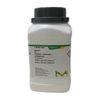Product Description
Sodium Carbonate 1kg Merck Germany
Chemical Composition: Sodium carbonate, also known as soda ash or washing soda, is an inorganic compound with the chemical formula Na₂CO₃.
Physical Appearance: It typically appears as a white, crystalline powder or granules that are odorless and hygroscopic (absorbs moisture from the air).
Solubility: Sodium carbonate is highly soluble in water, forming an alkaline solution.
Purity: Lab-grade sodium carbonate has a high level of purity, making it suitable for use in analytical and experimental procedures.
Molecular Weight: The molecular weight of sodium carbonate is approximately 105.99 g/mol.
Stability: It is stable under normal conditions but may decompose when exposed to moisture, forming sodium bicarbonate.
Uses:
pH Regulation: Sodium carbonate is commonly used in laboratories to adjust and maintain the pH levels of solutions.
Titration: It is utilized as a primary standard for acid-base titrations due to its high purity and stable composition.
Water Softening: It is employed in water treatment processes to remove calcium and magnesium ions, preventing scale formation.
Cleaning Agent: Lab-grade sodium carbonate is used in laboratories for cleaning glassware and equipment due to its alkaline properties.
Buffer Solutions: It is a component of buffer solutions used in biochemical and chemical experiments to maintain constant pH.
Precautions (Key Points):
Handling: Use protective gloves and safety goggles when handling sodium carbonate to prevent skin and eye irritation.
Storage: Store in a tightly sealed container in a cool, dry place, away from moisture and acids, to prevent degradation and contamination.
Inhalation Risk: Avoid inhaling the powder, as it may cause respiratory irritation; use in a well-ventilated area or with appropriate respiratory protection.
Contact with Acids: Avoid mixing with strong acids, as it can cause a vigorous reaction and release carbon dioxide gas.
Environmental Impact: Ensure proper disposal, as large quantities of sodium carbonate can alter the pH of water bodies, affecting aquatic life.
Emergency Measures: In case of contact with eyes or skin, rinse thoroughly with water and seek medical attention if irritation persists.

